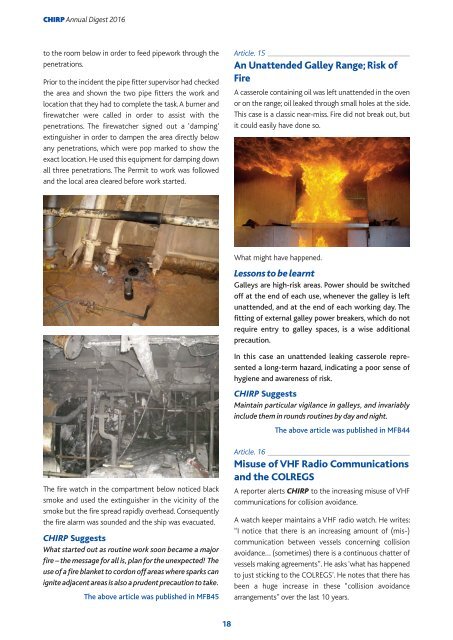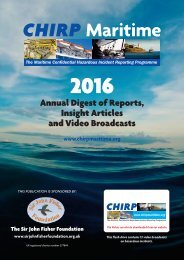CHIRP annual digest 2016 6th
Create successful ePaper yourself
Turn your PDF publications into a flip-book with our unique Google optimized e-Paper software.
<strong>CHIRP</strong> Annual Digest <strong>2016</strong><br />
to the room below in order to feed pipework through the<br />
penetrations.<br />
Prior to the incident the pipe fitter supervisor had checked<br />
the area and shown the two pipe fitters the work and<br />
location that they had to complete the task. A burner and<br />
firewatcher were called in order to assist with the<br />
penetrations. The firewatcher signed out a ‘damping’<br />
extinguisher in order to dampen the area directly below<br />
any penetrations, which were pop marked to show the<br />
exact location. He used this equipment for damping down<br />
all three penetrations. The Permit to work was followed<br />
and the local area cleared before work started.<br />
Article. 15<br />
An Unattended Galley Range; Risk of<br />
Fire<br />
A casserole containing oil was left unattended in the oven<br />
or on the range; oil leaked through small holes at the side.<br />
This case is a classic near-miss. Fire did not break out, but<br />
it could easily have done so.<br />
What might have happened.<br />
Lessons to be learnt<br />
Galleys are high-risk areas. Power should be switched<br />
off at the end of each use, whenever the galley is left<br />
unattended, and at the end of each working day. The<br />
fitting of external galley power breakers, which do not<br />
require entry to galley spaces, is a wise additional<br />
precaution.<br />
In this case an unattended leaking casserole repre -<br />
sented a long-term hazard, indicating a poor sense of<br />
hygiene and awareness of risk.<br />
<strong>CHIRP</strong> Suggests<br />
Maintain particular vigilance in galleys, and invariably<br />
include them in rounds routines by day and night.<br />
The above article was published in MFB44<br />
The fire watch in the compartment below noticed black<br />
smoke and used the extinguisher in the vicinity of the<br />
smoke but the fire spread rapidly overhead. Consequently<br />
the fire alarm was sounded and the ship was evacuated.<br />
<strong>CHIRP</strong> Suggests<br />
What started out as routine work soon became a major<br />
fire – the message for all is, plan for the unexpected! The<br />
use of a fire blanket to cordon off areas where sparks can<br />
ignite adjacent areas is also a prudent precaution to take.<br />
The above article was published in MFB45<br />
Article. 16<br />
Misuse of VHF Radio Communications<br />
and the COLREGS<br />
A reporter alerts <strong>CHIRP</strong> to the increasing misuse of VHF<br />
communications for collision avoidance.<br />
A watch keeper maintains a VHF radio watch. He writes:<br />
“I notice that there is an increasing amount of (mis-)<br />
communication between vessels concerning collision<br />
avoidance… (sometimes) there is a continuous chatter of<br />
vessels making agreements”. He asks ‘what has happened<br />
to just sticking to the COLREGS’. He notes that there has<br />
been a huge increase in these “collision avoidance<br />
arrangements” over the last 10 years.<br />
18



